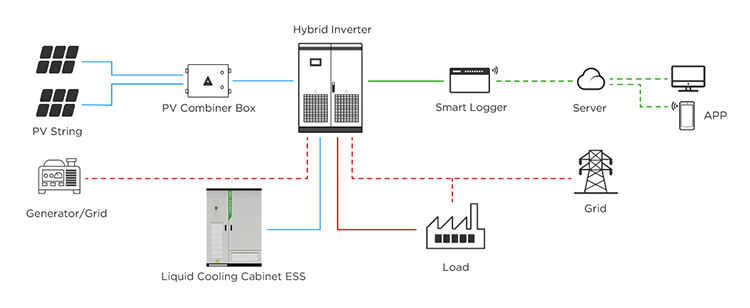Why More and More Energy Storage Companies Are Choosing Liquid Cooling Technology
In recent years, many energy storage companies have shifted their focus from air cooling to liquid cooling technology. Why is liquid cooling becoming increasingly popular among energy storage manufacturers? What advantages does liquid cooling offer over air cooling? In this article, GSL Energy, a leading energy storage system manufacturer, explores the benefits of liquid cooling technology.
A liquid cooling system typically consists of components such as a cooling liquid tank, circulation pump, liquid cooling pipes, heat exchanger, and temperature sensors. The system circulates coolant to dissipate heat from the internal components, ensuring efficient temperature regulation.

1. Higher Efficiency
Compared to air cooling, liquid cooling provides superior thermal conductivity. Liquids have a much higher heat transfer capacity than air, enabling precise control of temperature and flow rate for more efficient cooling. In contrast, air cooling relies on fans, which are harder to control and susceptible to environmental factors, leading to inconsistent cooling performance.
2. Enhanced Stability
The temperature of liquids fluctuates less compared to air, making it easier to maintain system stability by adjusting the flow and temperature of the coolant. This results in better thermal management for energy storage systems with high energy density. On the other hand, air cooling systems are more affected by ambient temperature changes, which can lead to overheating or uneven cooling, thereby compromising system stability.
3. Quieter Operation
Air cooling systems generate noise due to the operation of fans, which can be disruptive in certain environments. Liquid cooling, however, operates virtually silently, offering a much quieter solution. This is especially beneficial in applications where low noise levels are essential, such as residential or commercial energy storage installations.

Application Scenarios for Liquid Cooling Technology
The choice between cooling methods depends on the specific requirements of the energy storage system. For projects that demand higher stability and efficiency, liquid cooling is the ideal solution. It is particularly effective for large-scale, high-energy-density energy storage systems, especially in applications where batteries have high energy density, fast charge/discharge cycles, and significant temperature variations. Liquid cooling ensures better thermal management, extending battery life and enhancing system efficiency and reliability.
For instance, GSL Energy manufactures liquid cooling energy storage systems, including models such as 100KW/232Wh Liquid Cooling Cabinet energy storage system, 186kWh, and 372kWh. These systems, using lithium iron phosphate (LiFePO4) batteries, benefit from liquid cooling to effectively manage battery temperature, resulting in higher efficiency, improved performance, and quieter operation.
Conclusion
Liquid cooling technology is an ideal solution for large-capacity, industrial, and commercial energy storage applications that require high performance, safety, and reliability. While air cooling systems may offer advantages in terms of cost and convenience, liquid cooling provides significant benefits in terms of efficiency, stability, and noise reduction, making it the preferred choice for high-demand energy storage projects.


